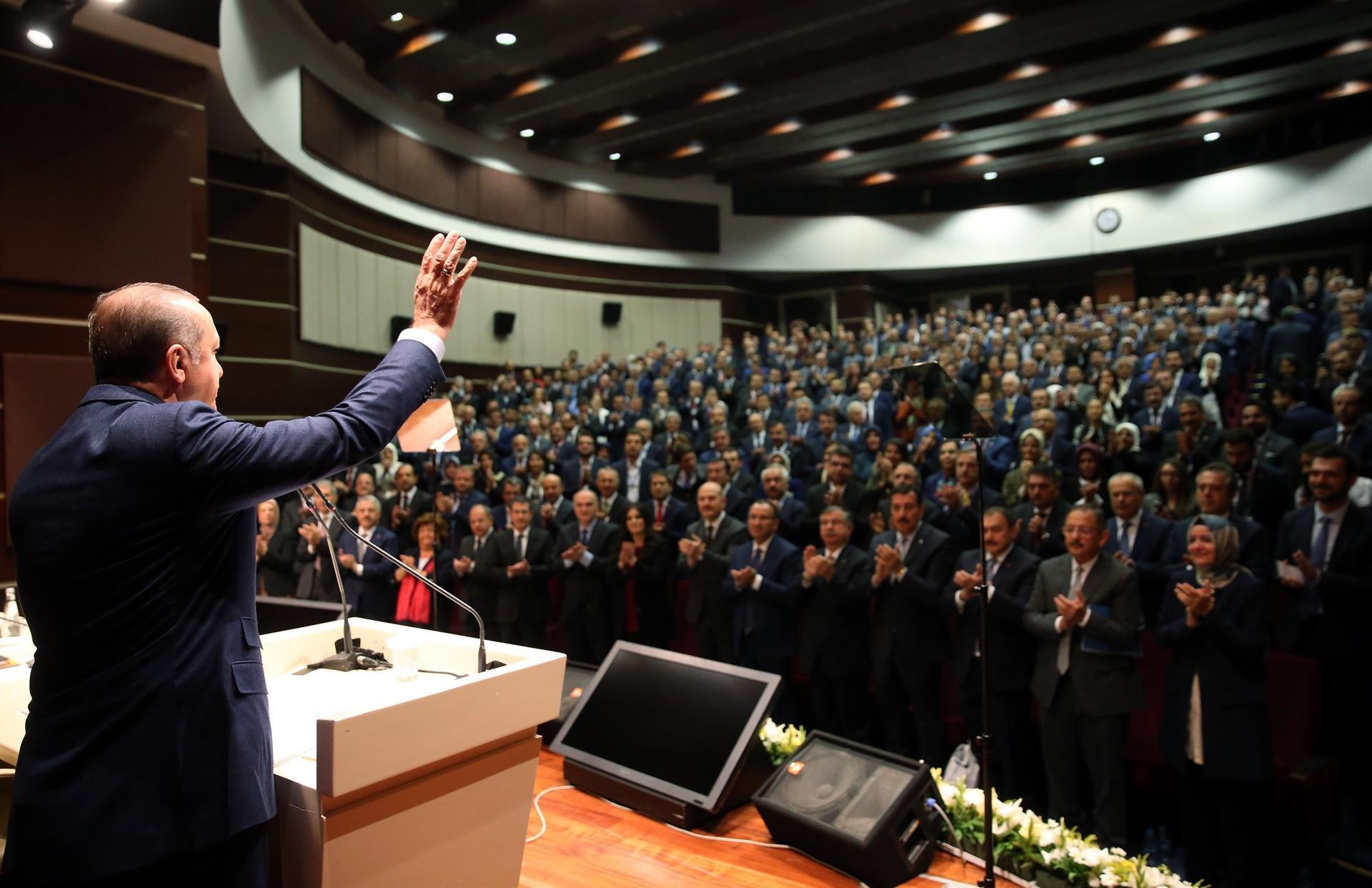Law allowing muftis to perform marriages will pass in the parliament: Erdoğan
ANKARA

President Recep Tayyip Erdoğan defended the new legislation that allows “muftis,” religious officials of the government, to register and conduct marriages amid fierce opposition arguing the implementation of such regulation would lead to a rise in the number of illicit and child marriages.
“They are heading to the streets making a fuss. Whether you want it or not, this legislation will pass in the parliament,” Erdoğan said on Oct. 13 addressing provincial heads of his ruling Justice and Development Party (AKP).
“They [marriages] will not go unrecorded, they will be under record. On the contrary, this implementation will abolish informality,” Erdoğan added, responding to the criticisms raised against the new legislation, which were accepted in the related parliamentary commission on Oct. 5 and are expected to be referred to the General Assembly in the following days.
The draft law that allows “muftis,” religious officials working under Directorate of Religious Affairs (Diyanet) of the government, to perform and register marriages has been submitted to the parliament on July 25 and have been receiving fierce criticisms from opposition parties and women’s rights groups.
As the current law assigns state registrars of marriages in municipalities to record marriages, the opposition argues that the new regulation will pave the way for “unrecorded marriages” and “child marriages,” and will also violate the secular principles in the civil code.
Stating that muftis are also state officials, Erdoğan said the regulation is not a violation of secular principles.
“What is the difference between a mayor, who is a public officer, conducting a marriage and a mufti, who is also a public official, conducting a marriage, other than the fact that one option corresponds to the values of our people more,” he said.
“People cannot be secular, only states can be secular. We, as the AKP, defined secularism as being at the same distance to every religion,” he said.
“If 99 percent of this country is Muslim, then we have to take this step as a necessity for the beliefs of Muslims … [In practice] large amounts of our citizens, as a member of our own values and beliefs, do not confine themselves to only an official marriage,” he said.
“They do what? They go to a hodja [a Muslim preacher] and make them perform another marriage ceremony,” he added arguing that the regulation will put these marriages under registration that will “reduce the illegitimate marriages.”
Criticizing the opposition to object to the regulation, Erdoğan argued that the rejections are only stemming from “the fact that the person who would perform the marriage is a religious official.”
“If you want to see how a political party is estranged from its society and its people, it is enough to just look at the CHP [the opposition Republican People’s Party],” he said.
“A young girl or a boy in Anatolia would not listen to those officials, but they would listen to a religious preacher,” he added, stating that child marriages will also be eradicated with this regulation.
Lawmakers, women’s rights groups protest
On Oct. 12, representatives of women’s rights groups coming from all around Turkey along with CHP lawmakers have staged a protest within the parliament against the legislation.
“We do not give a consent to it,” said CHP Women’s Branch Chair Fatma Köse, speaking on behalf of the group.
“This draft paves the way for a destruction of the rights that women have gained with the civil code. This draft enables child marriages. With this draft, a discussion on a marriage of what kind or by whom creates further polarization in society. Transferring civil rights to religious officials is against secularism anyway,” Köse said.
Köse added that there are burning women and children’s rights issues in Turkey and this regulation “is far from solving any of these problems.”
“We were obstructed from performing a protest in front of the parliament, but we will not give up on standing against this draft law until it is withdrawn from the agenda of the Grand Assembly,” she added.
‘Not discharge, but a change of duty’
Erdoğan also said the AKP management is acting on its decision to retreat some local positions “in determination,” instructing its provincial heads “not to allow any negative attitude toward the names that handed over their posts.”
“We have already started to make some regulation in some mayoralties with our local organizations. We are acting upon our decision step by step to make current names step down especially in some of the places that we see significant in order to make serious preparation for the new period,” Erdoğan said on Oct. 13, addressing AKP provincial heads.
“Of course, those who have stood aside their posts will continue to work and contribute to our party. It is not to discharge, it is the change of duty that arose from need,” Erdoğan added.
“We cannot let anybody voice even in the slightest negative words or act in an offending manner to our friends who have transferred their posts in local organizations or municipalities,” he said.
















